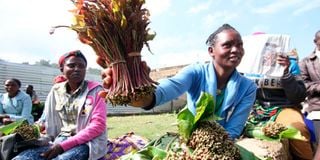Meru miraa traders bank on Somali's new president to lift ban

Miraa traders.
Miraa traders have expressed optimism that the regime change in Somalia on Sunday will revive trade relations with Kenya and salvage the dwindling fortunes of Khat.
Somalia suspended miraa imports from Kenya two years ago, on March 19, 2020, citing Covid-19 restrictions but the suspension was never lifted as diplomatic issues kicked in.
The ban led to a loss of a daily market for more than 50 tons of khat valued at more than Sh20 million then.
Somalia has since replaced the Kenyan khat with the Ethiopian variety after Mogadishu, in June last year, entered ‘a balance of trade deal’ that enables the Horn of Africa country to sell its fish to Ethiopia.
The country earns a big chunk of its local revenue from Khat import tax with the herb contributing Sh1.3 billion in 2021, according to the ministry of finance.
However, the election of Hassan Mohamud on Sunday, has revived optimism among miraa traders who are now calling for caution in how Kenya handles its neighbor.
“As an industry, we are happy that Mohamed Farmaajo has been voted out. The Kenya-Somalia relations worsened during his reign. We hope the channels of dialogue will re-open under president Mohamud,” Nyambene Miraa Traders Association (Nyamita) chairman Kimathi Munjuri said.
Speaking to Nation, Mr Munjuri said the Jubilee administration has mismanaged Somalia relations adding that the next administration should handle the neighboring country with care.
“Our problems with Somalia started when Kenya allowed the maritime dispute to escalate to the international courts. The next government should employ a better strategy that will not cost us business. We should also separate diplomatic rows from trade,” he said.
The Nyamita chairman said traders were ready to privately negotiate with the Somalia government to secure the business.
He noted that the loss of the market has cost the country and miraa farmers billions of shillings leading to dire socio economic consequences.
“We are currently relying on small shipments through Lamu which are not reliable. It takes about 72 hours and costs about Sh3 million to deliver 11 sacks of miraa to Somalia. Most of the time, a lot of the consignment goes bad. The risks are also very high because Kenyan khat is not allowed,” Mr Munjuri said.
Nyamita has been calling on the government to fast track talks with other countries to open up new markets for the now struggling crop. Among the new markets targeted include the DR Congo and Somaliland.





